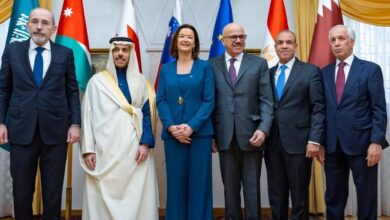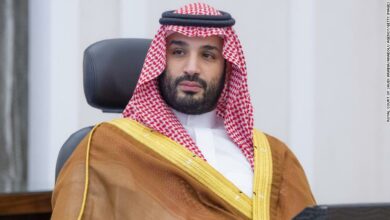Recent announcements that Qatar and Saudi Arabia have both granted Egypt US$500 million in budget support raised eyebrows among some Egypt-Gulf watchers, curious about whether the funding comes with any political strings attached.
Money given by a foreign country is usually driven by a strategic ambition — so what drives Qatari financial support for Egypt, and how does it differ from Saudi Arabia's?
The money is not known to come with any conditions, analysts say, but both countries have practical reasons to create niches for themselves as a new political system emerges in Egypt.
In the long-run, however, Qatar could be Egypt’s more important regional partner, as Saudi Arabia is hampered by domestic concerns.
“Qatar understands the importance of Egypt emerging as a strong Arab power. It has so much potential and will require support politically, economically and socially,” said Salman Shaikh, director of Brookings Doha Center.
Hassan Abu Taleb, an analyst specializing in Gulf issues at the state-funded Al-Ahram Center for Political and Strategic Studies, agreed.
“Qatar is aware that the Egyptian revolution is better for Arab interests, and it is trying to send a message to Egyptians, not the government, that it will help them pass this transitional period,” Abu Taleb said.
The small Gulf peninsula is known for its keenness on promoting Arab interests and acting as an alternative to US intervention in the region, which it regards as damaging, according to Gulf States Newsletter’s 30 September issue.
Saudi Arabia, Qatar’s much larger neighbor, is also a pragmatic player and will be looking for ways to support Egypt’s development. However, the country’s leadership had a closer relationship with Mubarak and is still thought to be smarting from the way he was deposed.
The kingdom is also held back by domestic issues. “I don’t think Saudi has a determined policy on Egypt largely due to its own internal situation, such as the ailing health of the king. There is not one single center of decision-making on many issues, including the Egyptian case,” Shaikh said.
Decision-making in Saudi Arabia falls under the purview of a large number of princes, while in Qatar the ruling Emir Hamad bin Khalifa al-Thani and his powerful wife Sheikha Mozah al-Missned are known for their personalized style of politics.
An old feud
Under Hosni Mubarak, the relationship between Egypt and Qatar was tense. The two countries were known to differ in their stances toward issues ranging from Darfur to Palestine.
Anecdotally, an Egyptian newspaper in the 1990s is said to have referred to Qatar as the “banana republic,” a pejorative term for an unstable country ruled by a small wealthy elite. It also plays on the name of Sheikha Mozah. And last year, two Egyptian nationals working in Qatar were charged with industrial espionage.
It is no surprise, then, that Qatar put its full weight behind the 25 January revolution once it was sure that a revolutionary movement had in fact begun. This was displayed through the Qatari state-owned Al Jazeera satellite channel's coverage of the Egyptian uprising.
“At the beginning of the Tahrir movement, Al Jazeera was conspicuous by its absence. When, after 36 hours, it appeared that it was a lot more than a flash in the pan, Al Jazeera covered it with aplomb — beforehand they held back not wanting to be accused of exacerbating the situation,” David Roberts, deputy director of the Royal United Service Institute in Qatar, said.
This marked a significant contrast with the coverage by other Gulf state-owned television stations, such as the Saudi-run Al Arabiya.
“When you compare Al Jazeera and Al Arabiya’s coverage, the latter was just like Egyptian state television during the 18 days,” said Ashraf El Sherif, a professor at the American University in Cairo who specializes in political Islamist movements.
Backing Islamists
In Egypt, rumors circulate that a lot of funding from the Gulf, through non-state actors, goes to support Islamist groups. But there is no clear evidence to confirm or deny this, analysts say.
“Qatar’s support for the Muslim Brotherhood internationally is pretty well-known. But on supporting Salafis, there needs to be more evidence,” Shaikh said.
Qatar is home to Egyptian-born cleric Yusuf al-Qaradawi, who held a prominent role in the Brotherhood and now preaches on Al Jazeera. Politically, it has also often argued that the Brotherhood needs to be more engaged, both in Egypt under Mubarak and with Hamas in the Israeli-Palestinian conflict.
Qatar’s position on Salafis, though, is more opaque. The proselytizing Egyptian Salafi group Ansar al-Sunnah has said it receives donations from charitable organizations in the Gulf, including Qatar, Saudi Arabia and the UAE, to build mosques and orphanages, but the activities of charities do not necessarily reflect state policy.
There are rumors that the presidential campaign of moderate Islamist thinker Mohamed Selim al-Awa and the Salafi-led Nour Party have received Qatari funding, according to El Sherif.
And though the Nour Party says it raises all its money domestically, El Sherif argues that when you compare their campaigning activities with their declared income — LE1 million per month — it does not add up, especially since their members are generally lower middle class.
Whatever the truth in these claims, they should come as no surprise, particularly as Islamists are set to emerge as influential players in Egypt’s political scene.
El Sherif, however, sees Qatari support for Islamists as more “pragmatic,” while Saudi’s — state or non-state — support is more “ideological.”
Qatar’s relationship with Islamists, particularly the Brotherhood, could be useful to Egypt, especially since most other Arab countries take a much more cautious approach.
“Qatar is ideally placed for creating dialogue among Islamists. It is the kind of positioning which has made it a valued independent actor, and fits in with a broader focus of mediating conflicts,” Shaikh said.
This could be particularly useful as the debate between Islamists and secularists on how to build a democratic Egypt develops.
Spreading the revolution
The success of democracy in Egypt, however, could be a threat to the stability of the Gulf monarchies, some believe.
“If the millions of Egyptians living and working in the Gulf states are given the right to vote, this will have significant moral and political implications for the host countries. It will put them under serious political pressure,” Abu Taleb said.
Egyptians living abroad were recently granted the right to vote, but not everyone thinks this will specifically trigger moves toward reform in Gulf states, particularly since Western expatriates in the Gulf have for a long time been allowed to vote through their embassies.
Some argue, rather, that the general momentum that began in Tunisia and Egypt continues to inspire reform movements, though not every monarchy will be affected in the same way.
“Qatar’s emir feels fairly confident that he has been able to portray his regime as the ultimate ‘liberalized autocracy’ — that is, a well-intentioned, democracy-supporting autocratic government that simply doesn’t need to pursue political reform in its own backyard given the genuine support of citizens and the prevailing favorable socioeconomic conditions,” said Christopher Davidson, a reader in Middle Eastern politics at Durham University.
He adds: “Saudi Arabia, on the other hand, soon faces a crisis. With a large population, limited resources and rising domestic pressures, its ruling family will come under intense pressure to open up the system. Otherwise, it will face the full consequences of the Arab Spring.”




